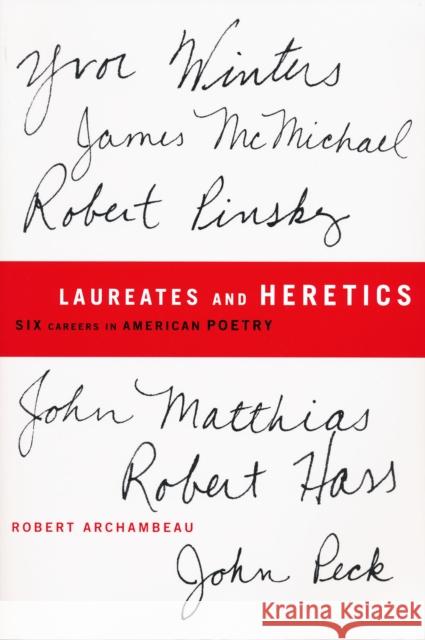Laureates and Heretics: Six Careers in American Poetry » książka
Laureates and Heretics: Six Careers in American Poetry
ISBN-13: 9780268020361 / Angielski / Miękka / 2010 / 264 str.
Robert Archambeau examines the influence of the poet and critic Yvor Winters on his final generation of graduate students at Stanford in the early 1960s: Robert Hass, Robert Pinsky, James McMichael, John Matthias, and John Peck. Archambeau divides the poets into two groups, laureates and heretics. Hass and Pinsky, each of whom served multiple terms as United Sates Poet Laureate, achieved both popular recognition and institutional renown. In contrast, the poetic accomplishments of Matthias, McMichael, and Peck (and to some extent Winters himself), the "heretics," have not resulted in wide readership or institutional canonization.
Archambeau begins with the context of the modernist poetics Winters first espoused and then rejected. The story that follows--of how his five most prominent students accepted, rejected, or transformed Winters's poetics, and how these poets went on to greater or lesser degrees of success in the field of late twentieth-century letters--illuminates the cultural politics of poetry in our own day. The author provides close readings of poems by this diverse group of poets, places their careers and works in the context of their times, and traces the relationship between American literary history and American canons of literary taste from the 1930s to the present day. "Laureates and Heretics" is an important contribution to American literary history and American poetry.
"I know of no other study of twentieth-century American poetry that so carefully and interestingly treats the works and careers of a single figure (Yvor Winters) and five of his students. The varying critical and public fates of Winters and the poets who worked under him make a fascinating study, even gesturing toward a global history of postwar American poetry." --Mark Scroggins, Florida Atlantic University
"This book is about the complexities of the relation between Yvor Winters and five former students as those complexities emerge in the poems themselves. Within these terms, it is exemplary because, unlike most critics and reviewers, Archambeau is not out to polemically endorse any specific position Winters himself took; he is as interested in departures from Winters' orthodoxy as in adherence; he is an extraordinarily sensitive reader of a considerable range of poetry." --Evan Watkins, University of California, Davis











